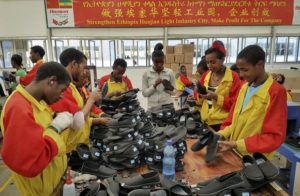 Nigeria, September 27, 2017//-It is 11:30am, and traders and buyers from all over west Africa are making their way to the Ariaria market in Aba, a bustling commercial hub in Nigeria’s southeastern Abia state.
Nigeria, September 27, 2017//-It is 11:30am, and traders and buyers from all over west Africa are making their way to the Ariaria market in Aba, a bustling commercial hub in Nigeria’s southeastern Abia state.
“Your shoes here! Your shoes here! Sir, this one is very strong and will last longer,” 30-year-old Ikechukwu Ani shouts as he seeks to attract buyers. “You will like this one, I made it with quality leather material,” he continues, lifting a brown pair with a stitched design and squeezing the leather to show its strength.
Aba, already a commercial hub, is now set to become a centre for light manufacturing in Nigeria. In April, state governor Okezie Ikpeazu signed a $1.5bn shoe factory deal with the Huajian Group, a Chinese company. Once up and running, the facility is expected to manufacture about 5,000 shoes per day and provide 10,000 jobs, directly and indirectly.
According to the terms of the deal, 80 percent of production would be destined for export to meet existing Huajian international orders while 20 percent would sell in the Nigerian market. The Hujian Group, valued at $2bn, currently employs about 20,000 staff in China.
This is not the company’s first foray into Africa. Hujian already has a factory up and running outside of Addis Ababa, Ethiopia. They signed a $2bn investment deal with the Ethiopian government to develop a light manufacturing hub there in 2013.
The Ariaria market is already the hub for shoe manufacturing across west Africa. Traders from Chad, Ghana, Togo, Niger and Cameroon come to the market every week to buy shoes and other leather materials to resell in their countries.
When they do not make it to the market themselves, they send their product specifications to local shoe manufacturers via text messages or phone calls for production and onward transportation to their destinations.
Every week, an estimated 1m pairs of shoes are exported from Ariaria international market to the west African coast.
Currently production is not automated. Using just a stove, thread and gum, shoemakers here can produce five to 10 shoes in a day. Their products sell at the market for between N6000 ($19.08) for shoes, N8500 ($27.03) for army boots and N3500 ($11.13) for sandals.
The market has already created thousands of jobs even as Nigeria struggles to come out of five quarters of recession. Unofficial records show the market contributes about 60 percent of the state’s N2bn ($10m) monthly internal revenue.
Big government contracts help. In August, the Nigerian army ordered the production and delivery of50,000 pairs of military boots estimated at N300m ($954, 000).
“I left my village in 2003 to come here to learn shoemaking,” says Chinazor Onyeabor, 35. “I am married with three children and it has been good for me.”
“I didn’t learn shoe making. It is a talent,” says Nnedinso Omeh, 21, a college student who is one of the few female shoemakers. “I am training myself in school with this but I need support from the government to produce more shoes.”
Attracting foreign investors like the Hujian Group will kickstart large scale, industrialised production in the city while shifting dynamics for locals.
“This deal will change the fortunes of the traders positively,” Mike Ugwu, an expert in the manufacturing industry, told This is Africa. “This deal will open doors for more investors and encourage favourable competition among the manufacturers.”
However, to some shoemakers in the market they fear it will stifle local entrepreneurs and threaten existing jobs.
“The government might benefit from their [Chinese] taxes but the deal is not good to us and will make us jobless. If the Chinese arrive with their big machines and cheap labour from here, how can we compete without machines?” asks Obinna Chukwuka.
Others suggest alternative means that the government could grow the industry without bringing in a foreign company. “Instead of bringing the Chinese here, the government needs to provide us with machines and modern tools on a loan agreement for us to pay back later. Without this, I doubt if we can survive when they come,” says Paul Nyama.
Hujian Group will also face structural challenges as it works to set up its factories – ones locals have been contending with for years.
Power outages occur regularly and without warning, a challenge local shoemakers say impedes their production. The cost of quality materials like leather, thread and adhesive gums have also increased as the naira has lost value.
“Sometimes we don’t have light for a whole month,” says Mr Ani, who uses a cooking stove to produce light while he works when the power is gone.
However, he remains optimistic about the industry’s future. “If we are provided with all we need, we will become the largest shoe industry in the world.”
Thisisafrica.com


